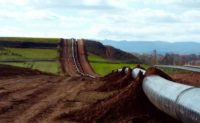The fight over the $1-billion PennEast pipeline, set to carry fracked natural gas 120 miles from Pennsylvania to New Jersey to serve the regional New York market, could be over after an agreement between the developer and the NJ attorney general over land seizure. Not clear is when, or if, any project construction will start soon or ever.
The agreement was filed in federal court in Philadelphia in late September, but details were not made public.
The company told ENR that it is not going to immediately pursue right-of-way acquisition for 42 land parcels owned by New Jersey, due to remaining project legal and regulatory issues. Just three months ago, it won the right to condemn those parcels in a major U.S. Supreme Court decision on eminent domain.
“PennEast is exploring with attorneys representing landowners the idea of dismissing the actions without prejudice and restarting legal proceedings once it clears the regulatory hurdles and has a better understanding of when it would need to acquire the property interests,” Patricia Kornick, a company spokeswoman said.
Environmental opponents believe the company is abandoning the project rather than delaying it.
“Actions speak louder than words, and this move clearly suggests the ... pipeline won’t happen,” said Tom Gilbert, campaign director for New Jersey Conservation Foundation and ReThink Energy NJ.
U.S. Rep. Tom Malinowski of (D-N.J.) said he “will continue to use every tool at my disposal to make sure, once and for all, that this pipeline is never built,” he said in a statement.
The company also abandoned condemnations in Pennsylvania. “The dismissal of these condemnation suits is a strong indication that the project will not go ahead, since the pipeline can’t be built along the proposed route without these lands,” Gilbert said. PennEast also does not have a federal Clean Water Act permit from the U.S. Army Corps of Engineers for construction in that state.
New Jersey and others still are challenging in federal appeals court in Washington, D.C., the project’s original certificate of need issued by the Federal Energy Regulatory Commission. That court recently overturned another pipeline's certificate of need due to insufficient proof of public need, Gilbert told ENR.
"We remain actively in litigation ... involving FERC’s decision to grant PennEast a Certification of Public Necessity and Convenience, with briefing wrapping up in that case in January," said Leland Moore, s spokesman for the state attorney general. "We are optimistic that we will ultimately prevail. It’s otherwise premature for us to speculate about whether and when PennEast would seek to restart its project if it succeeds in that litigation."
FERC Chairman Richard Glick, while serving as a commissioner, voted against PennEast’s initial permit in 2018.
“I believe that the record in this proceeding fails to demonstrate that the PennEast Project satisfies the requirements for a certificate of public convenience and necessity under the Natural Gas Act,” he said in his dissent. He saidt 75% of the pipeline’s subscribed capacity was with company affiliates and “insufficient to carry the developer’s burden to show that the pipeline is needed.”
PennEast asked FERC in January 2020 to divide the project into two phases, starting in Pennsylvania. As recently as August the firm had said that phase would be finished in 2022, with the New Jersey phase to be completed in 2023.
The company did not respond to ENR’s query related to the status of that timeline, but others labeled it as “completely unrealistic.” FERC tabled its request to divide the project when Glick became chairman in January.
The New Jersey Dept. of Environmental Protection twice denied permits for the project, saying it does not meet strict state standards.
in its third-quarter 2021 results reported in early August, pipeline partner New Jersey Resources said it took a $72.7-million after-tax impairment charge related to its PennEast investment.





Post a comment to this article
Report Abusive Comment